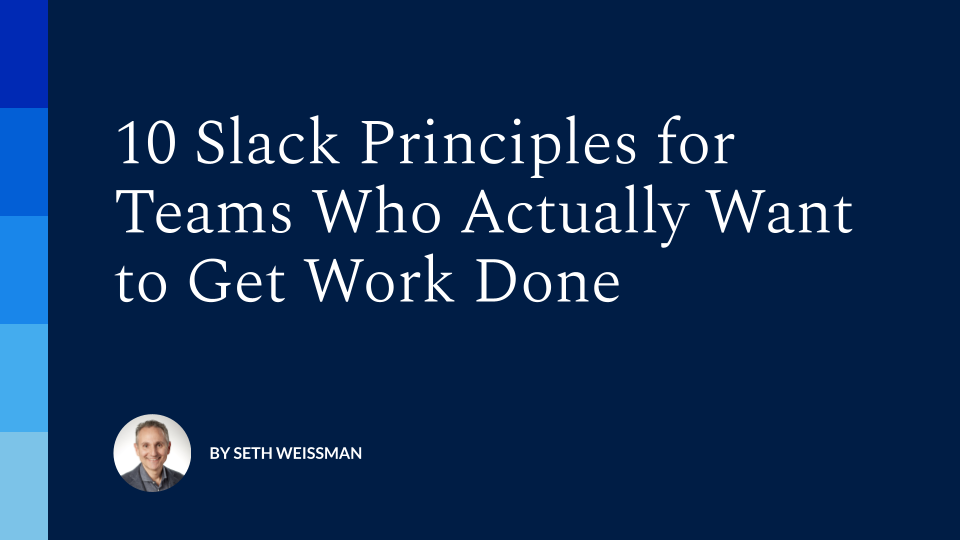10 Slack Principles for Teams Who Actually Want to Get Work Done
Over a decade ago, I wrote my first article on written office communication: The Ten Commandments of Email. Since then, office texting has become a hot topic, and with Slack's invention, we were given yet another digital way to assemble the Tower of Babel. Here are some thoughts on how to use Slack effectively. Notice I did not Slack them to you!
Money is Not a Talent Strategy. You Need a Unique Selling Propositio
A USP applies to more than just products; it applies to attracting and retaining talent.
Coaching, Listening, and Problem Solving
There are only three modes in a leader/report 1:1 session: coach, listen, or problem-solve, and while you might love to problem-solve, CEO/Leader problem-solving is a poor use of limited bandwidth; it feels productive but erodes development.
As Clear As Peanut Butter
It’s surprising how often we believe we’ve communicated clearly, only to realize, after the fact, that what we said made perfect sense to us, but not to anyone else.
We say things like, “Just run that report,” “Get that ready for the board,” or “Fix it.” These phrases feel efficient, even powerful. However, efficiency in speech is not the same as clarity in communication. Power without precision can lead to chaos.
Wheel of Work
The "Wheel of Work" is a coaching tool that helps clients gain a deeper understanding of the current state of their professional lives.
At the core of this tool lies the concept of self-awareness and the principle that measuring something is the precondition to improving it. The Wheel of Work comprises eight essential categories, each representing an important aspect of your professional journey.
From Mission to People: Designing Organizations from First Principles
I see a recurring pattern in hiring and promotions: Companies allow their current roster of talent to shape their strategy and structure, rather than ensuring that strategy and structure dictate who the company hires and promotes. This approach is backward, undermining both efficiency and effectiveness. To build a high-functioning organization, we must think from first principles, starting with Mission and Vision, moving through to Strategy, then Organizational Structure, and only then considering People.
Birds, Bears and Bushes
For all the remarkable advancements of modern civilization—skyscrapers piercing the clouds, spacecraft landing on distant planets, artificial intelligence reshaping our daily lives—there is one thing that has remained relatively unchanged: the mind. While our brains have evolved incrementally over time, the software that runs on them—what we call the mind—is still essentially running version 1.0.
The Five Stages of Commitment
Words matter—more than we realize. As coaches, we've seen how a simple shift in language can change everything from mindset to motivation. In this post, we explore five common words—should, need, want, will, and am—and how each one reflects a different stage of personal commitment and emotional energy.
The Four Stages of Learning: A Roadmap for Leaders Committed to a Growth Mindset
In this article, we explore the Four Stages of Learning—a framework every growth-minded leader should know. From blind spots to mastery, this model helps you embrace discomfort, seek feedback, and lead with continuous improvement.
How to Choose a Coach
In this article, we share how to choose the right coach by focusing on five essentials: formal training, accreditation (like ICF), personal fit, real-world experience, and effective tools. The right coach doesn’t just give advice—they help you unlock your potential and lead with confidence.
The Ten Commandments of Email!*
Email can be one of your most powerful tools—or a major source of frustration. In The Ten Commandments of Email, Seth Weissman, an executive coach with over two decades of C-suite experience, offers practical advice to help professionals communicate more clearly and effectively via email.
Ten Texting Tips*
In Ten Texting Tips, executive coach Seth Weissman—who also authored The Ten Commandments of Email—offers practical and insightful guidance on how to communicate effectively over text in a work setting. Given how common texting has become, mastering it as a communication tool is essential.
A CEO Decision Making Framework
As founder-led companies grow, a critical shift must occur: leadership must move from a centralized, CEO-driven model to a more distributed, collaborative approach. Scaling an organization means letting go of the "hub-and-spoke" system—where every major decision runs through the CEO—and instead empowering leaders at every level to make informed, aligned decisions closer to the source of information.
Your Two Teams, You and EQ
C-suite leaders don’t just lead—they serve on two critical teams…
Building a Company vs. Raising Children.
In this insightful article, executive coach and two-time IPO leader Seth Weissman teams up with Kelly McCarthy, a mother of three and fellow business leader, to draw compelling parallels between the stages of parenting and building a company. From the sleepless nights of the seed stage to the rebellious energy of a late-stage startup, Weissman explores how both journeys demand patience, adaptability, and relentless learning. With humor and heart, this article reminds us that whether you’re raising a child or scaling a business, success comes not from knowing all the answers—but from being open to the lessons along the way.
Herding Lions: Leading High-Performing Executive Teams
In this article, we explore what it really means to lead leaders. These are not followers. They are intelligent, independent, results-driven individuals who have spent their careers mastering their own domains. Now, at the executive level, they’re expected to collaborate across functions—without losing their edge.
The Transitions Framework: Endings
As William Bridges explores in Transitions: Making Sense of Life's Changes, meaningful transitions don’t begin with beginnings; they start with endings. These endings involve much more than just moving away from a familiar role, place, or mindset—they require us to deeply examine what we’re letting go of and why.
In this article, a deeper dive from my Transitions Primer, Nikki Mor and I will explore Bridge’s five ending milestones: 1. disengagement, 2. dismantling, 3. disidentification, 4. disenchantment, and 5. disorientation. By intentionally engaging with these five stages, we can extract valuable lessons, avoid repeating old patterns, and transition into our next chapter, the Neutral Zone, with clarity and purpose.
The Transitions Framework: A Primer
When we are trying to figure out what comes next in our careers, we can create clarity by focusing on the “why”…
Applying First Principles Thinking to Board Meetings
First introduced by Aristotle, a first principle is a foundational proposition or assumption that stands alone. We cannot deduce first principles from any other proposition or assumption. For example, economies of scale are a first principle; higher production or purchasing volumes improve efficiencies and lower unit costs. While first principles thinking is great for aligning executive teams, it's equally valuable for aligning management teams with their Board of Directors.
Building the Board of Directors
My later stage private company clients frequently ask for guidance on how to build a board of directors. Regardless of what stage the company is in, having a strong and productive relationship between management and the board is very important.




















